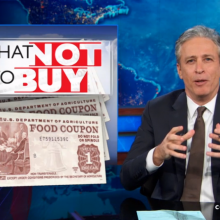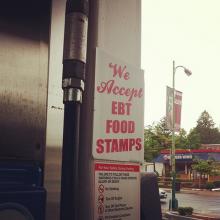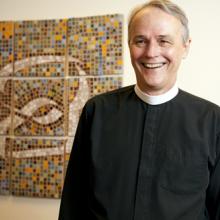food stamps
The Trump administration said on Wednesday it will make it harder for states to keep residents in the U.S. food stamp program in a move that is projected to end benefits for nearly 700,000 people.
No one should have to go hungry.
Unfortunately, the Trump administration has proposed a plan that will increase hunger in urban and rural communities across the country. Under a new rule proposed by the U.S. Department of Agriculture, “able-bodied adults without dependents” will find it harder to receive benefits from the Supplemental Nutrition Assistance Program, or SNAP, formerly known as food stamps.
"Work requirements do not create jobs; they instead create barriers to assistance for those who need them, oftentimes when their situation is most dire," House Democratic Whip Steny Hoyer (M.D.) and Rep. Barbara Lee (D-C.A.) said in a joint statement. "This executive order perpetuates false and racist stereotypes about certain groups supposedly taking advantage of government assistance."
If House Speaker Paul Ryan truly wants to promote a “compassionate conservative” agenda that counters the divisive rhetoric of the presumptive Republican presidential nominee Donald Trump, Ryan should follow the example of one man: Pope Francis.
I don’t typically watch much television. But when I can, I watch The Daily Show. Jon Stewart brings humor, satire and truth telling to the news of the day — qualities also characteristic of the Hebrew prophets. When I once suggested that to Stewart, he immediately denied any similarity, saying, “No, no, no, I’m just a comedian from the Borsch Belt!” But further discussion revealed a selection of topics that evoke his moral passion and even a righteous anger at political hypocrisy.
That was on vivid display in a spotlight on what Fox News commentators were saying about food stamp recipients. It began with Fox saying how families who receive support from SNAP (the Supplemental Nutrition Assistance Program) should use their food stamps, and even what they should and should not be eating, which led to repeated condemnations of poor people.
The clips from those Daily Show commentaries are below and I suggest you take a few moments to watch them. They reveal what I am calling Fox News’ “preferential option for the rich,” which is in stark contrast to the gospel’s “preferential option for the poor” and what Pope Francis is now calling the church back to. Fox News’ repeated preference for the rich and condemnations of the poor is not just a political or economic issue, but a moral and religious failure. The faith community, in particular, should take note.
ON NOV. 5, 2013, the people of SeaTac, Wash., enacted the highest minimum wage in the country, $15 an hour, more than double the federal minimum wage of $7.25 an hour.
On Black Friday, the biggest shopping day of the year, Wal-Mart workers at more than 1,500 store locations conducted protests and informational pickets. Fast-food workers in more than 100 cities protested in front of McDonalds, KFC, and Taco Bell stores, calling for wage increases.
Across the U.S., a grassroots movement is blossoming to address the extreme inequality of wealth and wages. Led by low-wage workers and bolstered by faith community leaders, this movement is shining a spotlight on the glaring disparity of wages, wealth, and opportunity.
The wealthiest 1 percent of households, those with annual incomes over $555,000, now receives more than 21 percent of all income. Meanwhile, millions of low-wage workers subsist on the federal minimum wage, which is $15,080 a year for a full-time worker. As a result, many low-wage workers depend on charity and public subsidies such as food stamps and Medicaid to survive.
If the minimum wage had kept up with inflation since 1968, it would now be $10.74, enough to boost a family of three over the federal poverty line, according to the Economic Policy Institute. If the minimum wage had increased at the pace of worker productivity, it would be $18.72 an hour today.
SNAP began in 1964 when President Lyndon B. Johnson signed the Food Stamp Act as part of his unconditional “War on Poverty.” In his remarks upon signing, Johnson said: “I believe the Food Stamp Act weds the best of the humanitarian instincts of the American people with the best of the free enterprise system. Instead of establishing a duplicate public system to distribute food surplus to the needy, this act permits us to use our highly efficient commercial food distribution system.”
Johnson continued: “It is one of many sensible and needed steps we have taken to apply the power of America's new abundance to the task of building a better life for every American.”
Imagine. Fifty years ago the Food Stamp Act was viewed not as charity, but rather as an ingenious utilization of American enterprise in order to help “build a better life for every American.”
And it is genius.
Many of us may not know what it is like to be hungry, to regularly miss meals, or to consume a diet void of essential nutrients to live a healthy life. Poet, diplomat, and politician Pablo Neruda captures this feeling well in his poem “The Great Tablecloth.” Just before the holidays, millions of Americans learned what some aspect of hunger felt like as they saw a reduction in their SNAP (formerly food stamp) benefits.
On Nov. 1, every SNAP household saw its grocery budget reduced when an $11 billion cut went into effect — the equivalent of 10 million food stamp meals a day. And the program isn’t out of the woods yet. The House and Senate have begun to finalize a farm bill that will impact vital anti-hunger programs. A compromise proposal expected in the coming weeks could further cut SNAP by as much as $8 billion, at a time when lawmakers need to protect and strengthen it.
The central figures in four of the planet’s largest religions – Christianity, Islam, Buddhism, and Judaism – were all once homeless. Moses was encamped in the Sinai, unable to return to the Promised Land. Jesus was born in a manger. Buddha wandered through the wilderness seeking enlightenment. The Prophet Muhammad was forced out of Mecca.
Is it a coincidence that each of these figures was, at key parts of his life, dispossessed from the society around him? Hardly. This is a clear message that even the most powerful can be made powerless.
In both Leviticus and Deuteronomy, believers are directed to give a set portion of their harvest to people in poverty and immigrants. It is neither voluntary, nor are the amounts to be based on charitable whims. It is a commandment to automatically give a specific percent, making it an anti-hunger tax of sorts. In fact, both the Old and New Testaments make it clear that justice is a higher calling than mere charity.
In Mathew 25, not only does Christ proclaim that those who clothe, house, and feed the “least of these” are engaging in acts equivalent to directly aiding the Lord, he also preaches that those who refuse to aid the poor are consigned to damnation.
Most secular ethical traditions also make societal actions to reduce hunger, poverty, and homelessness a centerpiece of their teachings.
Virtually every elected official in Washington claims to abide by these ethical and faith-based traditions. Indeed, many have used their professions of faith to advance their political careers.
Yet many of these same leaders repeatedly take actions opposite to the values they espouse.
Sojo editors looked back at the blogs of 2013 and found that these were the 10 most widely read Sojourner blog articles of the past year.
In his first Advent address, Pope Francis directed Christians to be guided by the “Magnificat,” Mary’s song of praise for the coming Christ child. She proclaims that God has “lifted up the lowly and filled the hungry with good things” (Luke 1:52-53). This past Tuesday, Pope Francis heeded his own exhortation by releasing a video message calling for an end to hunger as part of a worldwide “wave of prayer.”
Hundreds of Christian organizations across the globe participated in the “wave of prayer,” which was organized by Caritas International, a confederation of Catholic charities in the Vatican.
“We are in front of a global scandal of around 1 billion people who still suffer from hunger today,” Pope Francis said in his message. “We cannot look the other way.” The wave began at noon on the Pacific island of Samoa and proceeded west with people of faith from each subsequent time zone participating at noon their time.
Fear, anxiety, and secrecy marked the roughly year and a half I received federal food stamps.
Like the New Testament’s famed Samaritan woman who snuck to the well at an odd hour to get water, I tried to retrieve the sustenance my family needed outside the view of my immediate community.
I tried never to let those around me see me using the food stamp card, and certainly wouldn’t have ever told my extended family or friends. I wanted no one to know I was living outside the bounds of “acceptable” life.
I had decided to find out whether I qualified for the Supplemental Nutrition Assistance Program (SNAP) while a full-time seminary student trying to raise three teens — one of them in college. I worked jobs as much as I could around my school schedule, but in the end I never had enough money to pay bills, meet my children’s needs, and buy enough groceries for the month.
Gov. John R. Kasich (R-Ohio) did a shocking thing recently. He broke with his political allies and decided to expand Medicaid to 275,000 poor people in his state through the Affordable Care Act. Then he called a spade a spade, saying: “I’m concerned about the fact there seems to be a war on the poor.”
Kasich’s statement came just two days ago. And today, 47 million low-income Americans will see their food stamps benefits decrease as stimulus funding ends. In light of this newly named “war on the poor,” I’ve been reflecting on Jesus’ story of the Good Samaritan, and the man’s question to Jesus, “Who is my neighbor?” What an intriguing question.
Of course one of the most incredible things about this story is that Jesus never answers the lawyer’s question. Rather, he tells a story about a man beaten by robbers on a dangerous road. He was stripped naked left lying there, clinging to life. Both a priest and Levite pass him by, but a Samaritan went out of his way, broke his usual routine, used up his own gas (or at least his donkey’s energy) to bring the man to an inn. And he took care of him overnight at the inn, offering the innkeeper what would today be about $330.
And then Jesus flips the script! The lawyer asked who exactly is my neighbor? Who do I have to love? And conversely who can I cross off my need-to-love list?
Jesus doesn’t answer the question. Jesus returns his question with a question: “Who was a neighbor to the man who fell into the hands of robbers?”
Nowadays we hardly have a concept of what it means to be a neighbor anymore.
“Whoever has two coats must share with anyone who has none; and whoever has food must do likewise.” (Luke 3:11)
Many of us are blessed enough to not know what it is like to be hungry, to regularly miss meals, or to consume a diet void of essential nutrients for a healthy life. But now, millions of our brothers and sisters here in the United States may, sadly, be facing these situations because of a reduction in their food stamp benefits.
Starting Friday, all households receiving food stamp benefits will see their food budgets shrink as a temporary increase expires. A family of four could lose up to $36 a month in food stamps (also known as the Supplemental Nutrition Assistance Program, or SNAP).
WITH THE HEAT of mid-year finally over—judging by the fact that Dallas has settled into a sweater-friendly 97 degrees—it’s time to look back and see what we’ve learned from another summer filled with unpredictable weather extremes.
For example, a couple weeks in August were actually extremely comfortable, which was no help to my crusade to convince Fox-loving friends that the earth is warming. Lately, even scientists have been of little use, adamantly refusing to blame rampant forest fires and extreme droughts on climate change. They insist on “analyzing” patterns of weather “over time” to honor “standards of science.” There’s nothing worse than climatologists dragging their feet when there are righteous accusations to be flung. Global warming is behind EVERYTHING wrong! You know it. I know it.
Okay, sorry.
But this summer had way too many examples of the extreme consequences of climate change, including deadly tornadoes, inundating floods, and town hall meetings that brought forth a storm of discontent. Unsuspecting members of Congress had left the comforting gridlock of Washington, D.C., and, failing to first check for a full moon, had innocently invited questions from constituents in their home districts. This is almost always a mistake. You really need to test the water before you just walk into a home district unprepared.
Last night, Jim Wallis appeared on "The Ed Show" to discuss why it's imperative to avoid cutting social programs like food stamps that feed millions of poor and hungry in our country. Those pastors who disagree, he says, usually don't know the faces of those directly affected by such cuts. You can watch the segment Jim appeared on here:
Some read Romans 13 and lean toward faith being a personal thing (pay your taxes and don’t break the laws, avoid sexual immorality, debauchery, jealousy, and instead clothe yourself with Christ), but the chapter also says God has established government as his “servant to do good.”
This is why, in a country where the public is encouraged to participate in government, I want to encourage people of faith to voice the heart of God when it comes to issues like feeding the least of these.
Suddenly, unexpectedly, and almost miraculously, the values of simplicity, humility, welcome, and the priority of the poor have burst on to the international stage. A new pope named Francis is reminding us that love is also a verb — choosing the name Francis because of his commitment to the poor, to peace, and creation in sharp contrast to the values of Washington, D.C.
Last week the House of Representatives voted to cut food stamps. The previous week marked the 5th anniversary of the financial collapse, and showed more American inequality than before the recession. And now we face a threatened shutdown of the government unless the health care promised to tens of millions of uninsured people is repealed.
Pondering all that, I saw the interview with Pope Francis in America magazine and his profile in the new issue of Sojourners. And from every direction, things that the new pope was saying were breaking through the political news cycle. Even my students at Georgetown were telling me that their young friends, Christians or not, were putting Francis quotes up on their Facebook pages.

















